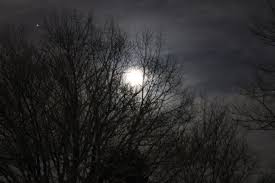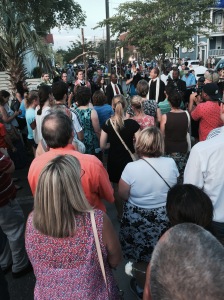In May 2018, I was honored to be part of a performance of the Charleston performance of, “Listen to Your Mother,” a live performance of essays about motherhood.
You can read my essay below, or scroll to the end and see a video of my performance. It was a helluva show and I made some wonderful friends. Enjoy!
“Are you going to be okay?”
My mother was on her deathbed and she wasn’t letting go until she made sure that her only child would be all right. Her dark eyes were sharp despite the pain, and lasered into mine.
A good daughter would offer reassurance. Mom had struggled for months and she was tired. A stronger daughter would ease her mind so that death could ease her body.
At that moment, I didn’t want to be strong. All I wanted was to push aside the monitors still strapped to her, and nestle under her soft arm, wailing and moaning and being weak. Mama, please don’t leave me.
Who will I be if I don’t see myself reflected in your eyes? How will I stand strong when I no longer have you as my soft place to fall?
My mother, my closest friend and biggest cheerleader, was dying. No, I wasn’t going to be okay. I probably would never be okay.
But that wasn’t what she needed to hear, and this moment was about her and her death, not me.
So, when she asked, “Are you going to be okay?” I answered, “Yes, Mama, I’ll be okay. You raised a strong one.”
And, she did, although I didn’t feel strong at the moment. She raised a strong one almost despite herself.
My mom lived in terror that something would happen to me. It was so important to her that I stay safe.
Her fears ranged from the traditional “stranger danger” to the repetition of mistakes she made. My mom married my dad quite young because she was pregnant with me. Up until she fell in love with my dad, she was a good Catholic girl from an Italian immigrant family, going to a Catholic high school. Sex – let alone pregnancy – before marriage was a sin and my presence in my mom’s womb caused grief for everyone my mom knew.
It didn’t matter that she and my dad married and would stay happily married for 53 years until Mom died. My mom was determined that I would never make the mistakes she made.
Sometimes, it meant that she overreacted a bit.
My announcement in 7th Grade that I was “going steady” with a boy – which meant only that we would hold hands and sit together at lunch – was met with screaming… and tears…and threats… and dire warnings unless I returned the cheap silver ring he had given me. Sobbing, my mother explained that spending time alone with a boy so young would lead to “urges”… and then giving in to those urges… and then sex and pregnancy and disgrace and destroyed potential.
It seemed a bit extreme, but I gave the ring back.
In college, when I went camping –not my thing, but my boyfriend at the time sure loved it – she sent news clippings about a crazed killer who had murdered young people in their tents.
It was just one of many dire warnings as my mother let me know that I was truly wonderful – but likely to be struck down by fate or drunken drivers or serial killers at any moment.
And, as I got older, I promised myself I wouldn’t be bound by my mother’s irrational fears.
Living in the city? Yep. Waiting for a bus on dark street corners after covering a meeting for the local paper? Sure, I was tough. Sex? AIDS wasn’t really a thing yet and the Pill was, so BIG yes.
I was fearless. And I wasn’t going to let my mom’s obsession with my safety affect my life.
And, when I had my own daughter one day? She was going to be fearless too.
Except, right before I got pregnant with my fearless daughter, there was a case in which a young girl was taken, just as her mother looked down to pack up their things after a Christmas party at their apartment complex. She looked up and her daughter was gone. And she would stay gone until her body was found, years later.
So, yes, my daughter would be fearless, but I would keep a better eye on her so she would also be safe.
And because I had taken so many risks in my life on the road to being strong, I could share with her the obstacles that might trip her up.
I would raise my daughter strong but safe.
Well, that’s what I thought I was doing.
Isn’t it funny how your children can become a mirror to reflect back to you a version of yourself you just don’t see?
My daughter is an adult. She has a wonderful job, a rich life, and boundless enthusiasm for one thing after another.
Recently, she decided to raise chickens. She has her own house, so it’s not like she’s going to be raising them in an apartment.
But I immediately started trying to clear the obstacles. Had she checked zoning in her city? Informed the neighbors? There are woods nearby and her yard isn’t fenced – what about the danger of coyotes?
Hard to imagine, I know, but she didn’t react well.
And, confident in my rightness, I laid out a list of all her enthusiasms over the years and how few she’d stuck with, and why listening to me would have saved her time.
This was by text, by the way. That’s how we seem to conduct all our arguments these days.
And, my daughter, in the most loving way possible considering how angry she was, sent back a text with a list of her own. All the times I had responded with dire warnings very much like my own mother had done.
Lost that extra 10 pounds? Great, but don’t expect the rest of the weight to come off as quickly because the last five pounds always hang on. Buying a house? Great, but don’t spend too much on decorating, because things are going to break and you’ll need money for that. Make more money than your photographer boyfriend? Fine, but one day he may come to resent the disparity — and you may as well — so be prepared for that.
My daughter told me: “You will say that you’re proud of me but honestly it doesn’t mean much because you turn around and question every decision I make. Not in a constructive way, in a limiting way, a way that takes away my feeling of autonomy. I’m simultaneously the light of your life, but incapable of making informed decisions, impulsive and foolhardy. It gives me whiplash.”
I, who prided myself on being fearless and optimistic, had become the Greek chorus of doom in my daughter’s life.
Even in the midst of the text argument, I had told my daughter that I loved her. Her response?
“I love you right back but my perception of you is that you are far more negative than you think you are.”
It rocked me.
All I wanted was my daughter to be safe. Why couldn’t she listen to me?
And then it hit me.
My daughter was ignoring my dire warnings, much like I used to roll my eyes at my own mother’s doom and gloom. My daughter wasn’t stupid and she wasn’t reckless, but she had assigned my drumbeat of fear the role of just background noise.
And, by raising a daughter who ignored me, I too had raised a strong one.
WATCH THE VIDEO




